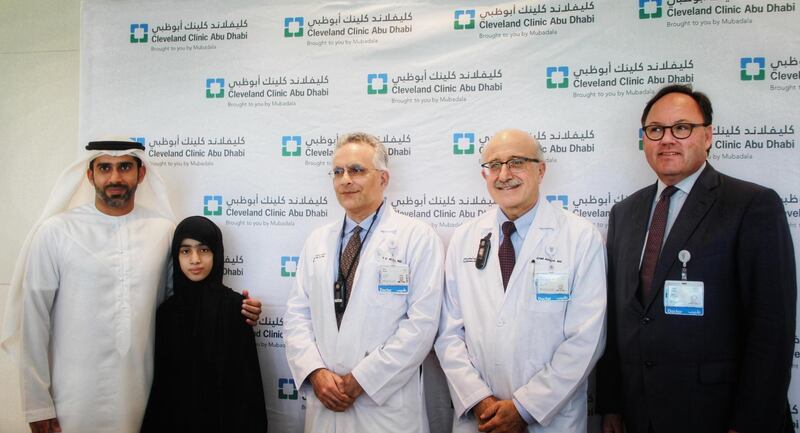Two Emirati sisters were among the first patients worldwide to receive a new gene therapy to treat patients with a rare inherited eye disorder that causes blindness.
The procedure, which injects a lab-created virus that helps the eye produce necessary proteins, has been recently introduced to Cleveland Clinic Abu Dhabi.
The sisters Alia, 13, and Hessa, 11, are affected by retinal dystrophy - a rare genetic disorder that affects their ability to see, especially in dim light.
The girls inherited a faulty copy of the RPE65 gene from their parents.
This particular gene helps provide the pigment that is needed to absorb light, and a lack of it eventually leads to complete loss of vision in all cases.
The condition affects an estimated 1 in 200,000 people worldwide, however, the prevalence is thought to be higher in the region given the genetic makeup because of consanguineous marriages.
“There are many different causes for inherited retinal disease and it is more common in this region than many other areas of the world,” said Dr Arif Khan, ocular geneticist at Cleveland Clinic Abu Dhabi, who diagnosed the two sisters and led the initiative to bring the treatment to Abu Dhabi.
“It is a more constricted gene pool [here], and the social preferences [for marrying within the same family] increases the prevalence of recessive diseases.
“We are aware of several families [with recessive diseases],” he said.
Alia and Hessa were both diagnosed with the disease when they were two-months-old, but there was no treatment available in the UAE or abroad.
“We visited some centres abroad, and a specialised centre in Europe but there was no treatment available for such cases,” said the girls’ father Mubarak, a PE teacher.
It was not until the end of 2017 that the Federal Drug Administration (FDA) of the United States approved the use of gene therapy for this condition after extensive clinical trials.
In June 2019, the UAE Ministry of Health and Prevention followed suit and approved the treatment, becoming the third country globally to do so.
Gene therapy for retinal dystrophy involves injecting a viral vector with a functioning RPE65 gene into retinal tissue, said Dr Emad Abboud, the retinal surgeon who performed the operation.
The functioning gene is then introduced into the cells and normal protein production can be restored, thus preventing further vision deterioration.
“So when the doctors said they were bringing the treatment here, we immediately signed up for it,” said Mubarak.
He said the surgery, which took around an hour to perform, went smoothly, “and they only needed one week of recovery.”
Alia and Hessa received the defective gene RPE65 from both parents, who happen to be related.
As a result of the gene defect, their eyes were unable to create enough RPE65 proteins. Since the protein is vital to the retina, the part of the eye that senses light, the girls’ vision deteriorated seriously.
Before the procedure, the girls “could somewhat see in the light, but in the dark they couldn’t see anything at all,” said their mother Fatima, a family doctor.
While their vision will continue to improve for a year, the girls’ vision is already starting to improve in the dark.
“When I used to walk into my room I wasn’t able to see where the bed is, now I can,” said Alia.
“Or when I went to a restaurant with dim lighting I couldn’t see the food in front of me, now I can.
“After one year, hopefully I’ll be able to see even better.”
Alia said she can now also differentiate between some colours that she could not see properly before.
“Like I could not see the difference between orange and pink, and blue and green.”
The girls go to public schools, but require the assistance of a shadow teacher and magnifying glasses to read and write.
This gene therapy is among the first to be approved by the FDA, and “opens the door” for other future gene therapy applications, said Dr Khan.
Such therapy can address not only gene disorders but also chronic diseases like diabetes that need recurring treatment.
Currently, less than 10 countries have hospitals with the capability to perform this procedure, he said.





